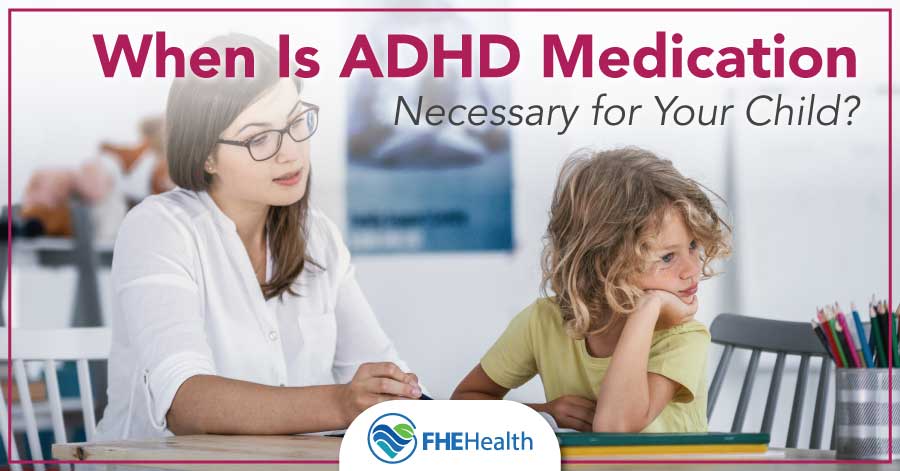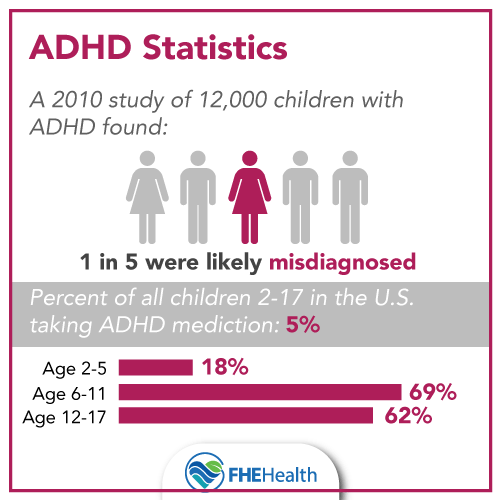
It’s estimated that 13% of men and 4% of women live with an attention-deficit disorder such as ADD or ADHD. These conditions significantly impact a person’s ability to focus in certain settings, which is why many adults in this population manage their condition with medication.
In children, however, addressing ADHD is not so clear. Without a behavioral history to use as a reference, in many cases, children without ADHD are misdiagnosed, and children who have ADHD aren’t recognized as such. When children with learning disabilities don’t get the specialized attention they need, they won’t develop as well in school and often have difficulties with behavior and developmental socialization.
In this piece, we discuss using medication to manage your child’s ADHD: When it’s necessary, when it’s not, and how to obtain a prescription when it is.
So, You Think Your Child Has ADHD
 Frankly, “Does my kid have ADHD?” is a thought that flashes across more parents’ minds than they may admit. Almost every child has attention or discipline problems at some point. These issues may even be long-lasting, but here’s what’s important to remember: Not everyone with these issues has ADHD or any other mental disability.
Frankly, “Does my kid have ADHD?” is a thought that flashes across more parents’ minds than they may admit. Almost every child has attention or discipline problems at some point. These issues may even be long-lasting, but here’s what’s important to remember: Not everyone with these issues has ADHD or any other mental disability.
Here’s a hypothetical situation: Let’s imagine that your child just turned 7 years old. Until now, there was no reason to think anything abnormal was going on. He learned to walk and talk in the age ranges that those skills are considered normal, and everything else with his development has been relatively unremarkable.
He started school at the age of 5, and suddenly, teachers are calling you in to talk about his behavior. He’s not paying attention to teachers and acting out with other students. He can’t sit still and is a distraction to the rest of the class.
As the years go on, the issues persist. Your child has started losing assignments and getting lower grades. His class notes are disorganized, and he’s begun to take part in risky and potentially dangerous activities with his friends.
If this is a familiar situation, you share the same struggle as many parents with worries about their children’s behavior. At what point do you draw the line between normal kid stuff and a potentially impactful disorder?
The answer to this question lies in a deep understanding of the condition itself.
What Is ADD/ADHD?
 While ADD is often used as a blanket term for anyone who has difficulty paying attention, ADD isn’t a recognized condition in the Diagnostic and Statistical Manual of Mental Disorders (DSM-5).
While ADD is often used as a blanket term for anyone who has difficulty paying attention, ADD isn’t a recognized condition in the Diagnostic and Statistical Manual of Mental Disorders (DSM-5).
Medical professionals view the term “ADD” as outdated and have come to the consensus that everyone with this kind of disorder has a type of ADHD, or attention deficit hyperactivity disorder. A person with ADHD doesn’t have to exhibit hyperactive behavior, contrary to the now somewhat outdated prior perception of the disease.
Children with ADHD express one or more of the following behaviors:
- Hyperactivity and difficulty sitting still
- Poor attention span
- Impulsive behavior
The type of ADHD a person has depends on which of these behaviors they exhibit.
What we used to call ADD describes a person who exhibits a lack of focus, impulsive behavior and disorganization. It’s now referred to as Predominantly inattentive ADHD.
Predominantly hyperactive-impulsive ADHD describes a person who is hyperactive and impulsive but doesn’t express the same difficulties staying focused or paying attention.
Many people with ADHD don’t fit into one category or the other. These people are known to have combined ADHD.
In adults, ADHD can be easy to diagnose because once a person’s central nervous system is fully developed, hyperactivity, impulsiveness and short attention span stand out more.
The issue with diagnosing children is that, to some degree, these behaviors are common among children, so it’s difficult to differentiate between a possible mental disorder and normal childhood behavior.
Something many parents want to know when told that their child has ADHD is “Does ADHD go away,” which is a question with no simple answer. Many children do outgrow the symptoms of ADHD, and many more are able to manage the impact on their lives into adulthood. For a large number of children with ADHD, however, the condition’s effects are lifelong.
Treating ADHD Without Medication
It should be stated that if you take your child to a doctor, and they diagnose ADHD, medication should be strongly considered as part of a multifaceted management plan. With this in mind, parents have used a number of successful methods to reduce the impact of ADHD on their children’s lives.
Why Try to Manage ADHD Without Medication?
 Like many diseases, ADHD isn’t something you should just throw medicine at. You have to find a balance between enabling your child to be successful in school and at home and changing their life and their routine in a drastic way.
Like many diseases, ADHD isn’t something you should just throw medicine at. You have to find a balance between enabling your child to be successful in school and at home and changing their life and their routine in a drastic way.
Some of this depends on the severity of the condition. Children with mild ADHD have a little more leeway in finding a treatment that works for them. Severe ADHD needs a more direct solution.
The reason why ADHD is in a group of conditions that people are hesitant to solve with drugs right off the bat is the rate of misdiagnosis. A 2010 study of 12,000 children diagnosed with ADHD found that 1 in 5 were likely misdiagnosed, simply because they were more immature than their peers.
Some of the conditions that are commonly misdiagnosed as ADHD in young children include:
- Autism
- Bipolar disorder
- Low blood sugar
- Sleep disorders
- Sensory processing disorders (SPDs)
Often, normal childhood behavior is mistaken for ADHD, illustrating why terminal solutions are generally not recommended after the initial diagnosis.
How to Treat ADHD Without Medication
A variety of different ways to approach ADHD treatment without resorting to medication first have shown varying degrees of effectiveness:
A Healthy Lifestyle
Healthier children are often better behaved, regardless of mental conditions like ADHD. One way to test for a possible misdiagnosis is to start helping your child eat better, get more sleep and, most importantly, get plenty of exercises.
It may truly be as simple as that. When kids don’t get enough exercise, energy builds up and may manifest itself in disruptive ways.
Therapy
Several varieties of therapy have been proven effective in managing the symptoms of ADHD in children, ranging from one-on-one meetings with a counselor to family therapy sessions.
Positive Parenting Program
A newer, evidence-based method of treating childhood ADHD is called the Positive Parenting Program, or Triple-P. The methods involve structured parental support for these children, and early studies suggest that Triple-P is among the most promising emergent methods of managing ADHD.
When ADHD Medication is Necessary for Your Child
When non-medicinal techniques fail, you’ll want to consider other options for children with ADHD. ADHD medications are split into two categories:
Amphetamines
- Adderall
- Dexedrine
- Vyvanse
Methylphenidates
- Concerta
- Ritalin
- Metadate
Here’s everything you want to know about accessing the medicinal solution that’s right for your child.
What Does the Prescription Process Look Like?
Your child’s doctor will usually diagnose ADHD before prescribing ADHD medication. After this occurs, you’ll have a chance to talk through the best treatment strategy and be given a recommended dosage of one of the more common stimulants for your child’s condition.
Can You Ask for ADHD Medication?
You can ask, but your request will only be granted if a medical professional deems that the use of these drugs will help your child. Prescribing medication on improper grounds is considered malpractice.
Who Prescribes It, and at What Age?
Medical doctors prescribe medication, and the drugs listed are approved by the FDA for patients 6 years of age and older.
Options for Prescription Medications
The options listed above are by far the most common. Methylphenidates are generally regarded to be safer in long-term use than amphetamines, but both classes are approved for the therapeutic treatment of ADHD.
Other products are advertised to treat the symptoms of the condition, but regulatory bodies in the United States do not assess these claims.
Is the Prescription Lifelong?
How long your child will remain on ADHD medication is handled case-by-case, but there are many cases in which a younger ADHD patient has successfully lowered or ceased their dose at a later stage.
Medication Management at FHE Health
At FHE Health, we don’t treat minors, but since ADHD affects many of our adult patients and their children, we feel that it’s still an important issue to address.
If you are an adult with treated or untreated ADHD, contact FHE Health to learn more about your options. If you have a child who you think may have this or a similar condition, the best option is to have them examined by a medical professional.






